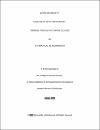DEFENSE STRATEGY OF QATAR 2013-2020
| المرشد | Zweiri, Mahjoob |
| المؤلف | AL-MOHANNADI, FATMA HILAL |
| تاريخ الإتاحة | 2023-03-14T06:30:02Z |
| تاريخ النشر | 2023-01 |
| الملخص | Instability in some parts of the world impacts governments in many aspects, particularly in defense, foreign policy, and economic strategies. Governments should identify threats and challenges to the state in tandem with its natural resources and regional security variables. This requires continuous evaluation of security and economic indicators. This thesis focuses on Qatar's defense strategy between 2013 and 2020. Qatar has undergone several stages in implementing its defense strategies since its independence in the 1970s. In general, the defense strategies of a small state adopt alliances in response to threats (bandwagoning), strategic hedging, neutrality, and alliance shelter strategies. Being located in a sensitive area, surrounded by large and powerful countries in an unstable region, Qatar -as a small state- has entered into several defense agreements with different countries to enhance its security. In addition, the decline of major power brokers in MENA has enabled small states to emerge and play more significant roles in various sectors. In the 1990s, the regional and international systems witnessed significant shifts in the wake of critical events in the region, such as the Gulf War in 1991 and the collapse of the Soviet Union in the very same year. Such a collapse marked the end of a bipolar international system, where the world shifted towards a unipolar system under the leadership of the United States. This was followed by the U.S. military victories in the Gulf, including the 2003 Invasion of Iraq, and intensive U.S. military presence in that region. Accordingly, the Qatari defense strategy moved towards relying on the U.S. military existence in Qatar as a source of security. In response to regional security changes, Qatar's defense strategy has changed; the blockade of Qatar in 2017 led to a shift in the strategy due to neighbor countries' threats. The Qatari government was able to survive the crisis; the blockade ended with the signing of the Al-Ula Declaration in Saudi Arabia in 2021 without any waivers from Qatar. As a small state, Qatar has been able to preserve its sovereignty and security. The Qatari government seeks to improve its defense and security policies and strategies in response to security variables in the Gulf region. In addition, the Qatari government has focused on promoting its relations with international organizations, which was reflected in international cooperation. The main argument of this thesis is that the 2017 blockade enabled the Qatari government to discover weaknesses in its defense strategy. Qatar's defense strategy is changed based on the source of security threats, which means that Qatar did not have a certain/ one defense strategy as it has changed based on the source of perception of security threats. As a rich country, Qatar was able to improve its defense strategy rapidly during the crises and Foreign policy had the ability to enhance Qatari defense strategy, drawing on international relations and organization. In this thesis, I examine how diversification in foreign policy and defense and military strategies is vital for small states, particularly when a state has an active foreign policy in an unstable region. Moreover, I explain the motivation of the State of Qatar for engaging in new alliances, for instance, with Turkey and Iran, and how these political and military alliances helped Qatar secure its territory from the blockading countries. Finally, I address the role of soft power and diplomacy in promoting security. |
| اللغة | en |
| الموضوع | Qatar's defense strategy strategic hedging neutrality alliance shelter strategies |
| النوع | Master Thesis |
| التخصص | Gulf Studies |
الملفات في هذه التسجيلة
هذه التسجيلة تظهر في المجموعات التالية
-
دراسات الخليج [77 items ]


